#imo ig
Explore tagged Tumblr posts
Text
I will never understand fandoms giving characters random ass nicknames
#ro for ronan#drew for andrew#especially those two#like why#i think they would both hate it actually#OH lau/laur for Laurent#it always feels so random and unnecessary#is it amateur writing? like not knowing what else to do to make characters appear close?#also nicknames don't like pop up from nowhere#theyre developed even when random#so to give a developed character and relationship a nickname just makes it strange#imo ig
0 notes
Text



98 lovemail doodles >_<
#trigun#meryl stryfe#milly thompson#nicholas d wolfwood#i was able to convince my friend to start 98 after we got back from AX HAHA and so i wanted to doodle the gang again ^_^#it's so funny how i always draw trimax ww super grumpy but then my 98ww is always such a goofy goober BAHAHA#trimax ww is still pookie to me tho dont get it twisted!!! ^_^#but yeah it's fun to decide how i want to differentiate between the different versions of ww#also i love 98 meryl so much she is so let me speak to the manager core (heart eyes)#and the color palette for vash i referenced from the lost july episode bc I LOVE IT SOOOO MUCH THE COLORS IN THE PLANT STATION SCENES#idk what it is abt it but it tickles my brain. so pretty T__T#man im fr that type of artist who is posting different versions of the same drawings on different platforms LOL#but yall on tumblr and ig get it better imo hehe. when i post on twitter im like fucket whatever#i usually dont post on tumblr/ig until a day or two later so by then i make a couple of changes/finish stuff/color stuff#so here u go enjoy the colored versions of these doodles HAHA
7K notes
·
View notes
Text

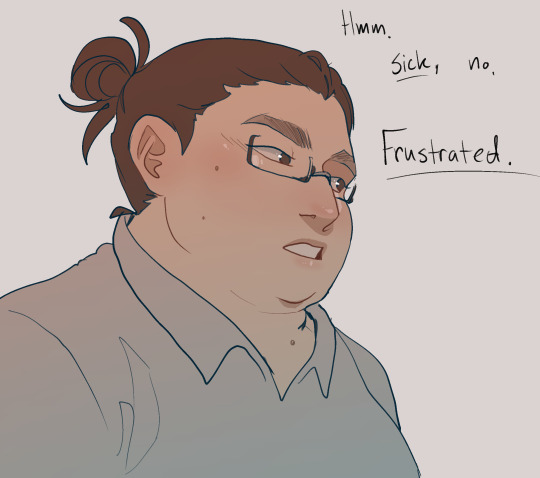

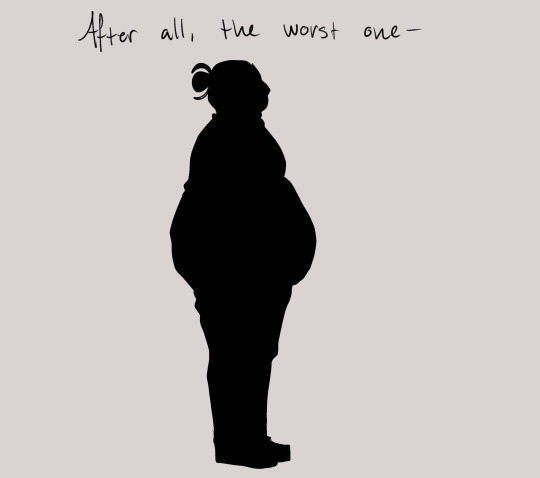


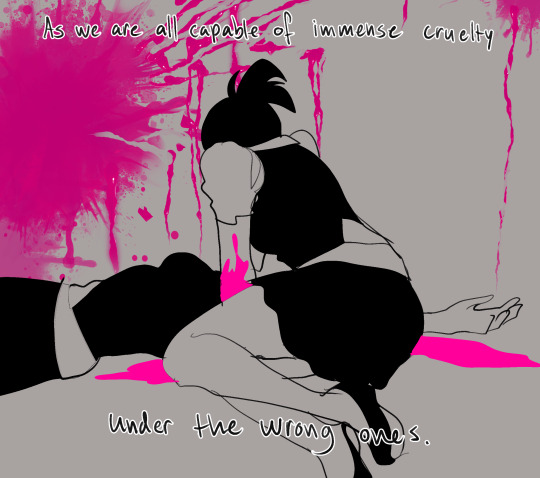
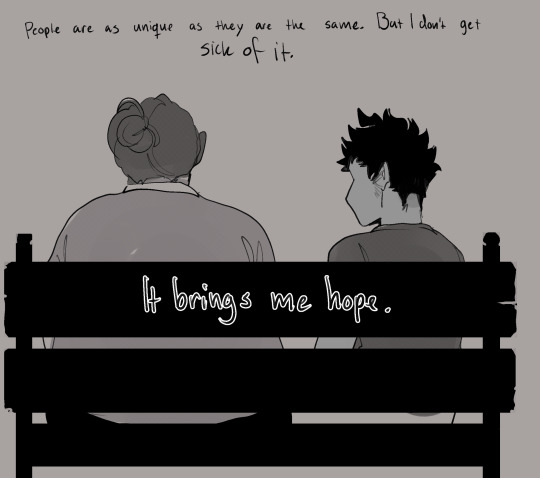
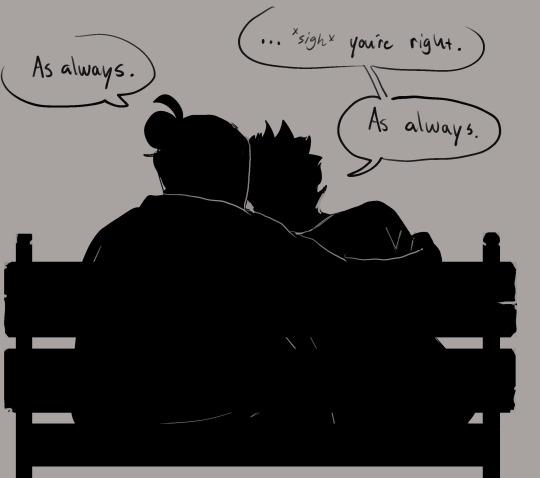
💕
#ultimate imposter#Hajime hinata#Twohina#An art#Sdr2#sdr2 nagito#danganronpa 2#Okay long tag rant incoming#I got into a comment thread on ig because I was mouthing off. Dumb of me I know I keep doing this#And it woke up a nasty side in myself that I don't like. Not that I said anything undeserved#but I was getting a little too into the satisfaction of it. And if you let yourself gloat in being nasty#You're more likely to allow yourself that in other situations and imo you just shouldn't indulge yourself in that#At least I shouldn't. Its not about being self satisfied. Anyway. SUCH A TANGENT#I had a little self reflection moment when I woke up and decided to stop being angry at people in my head. Even shitty people are just peop#And idk maybe that makes sense to someone. If this comic is super nonsensical to you dwbi lol#Okay that's it. Tap mic. Thanks you. Tip your waitress.#twogami
1K notes
·
View notes
Text
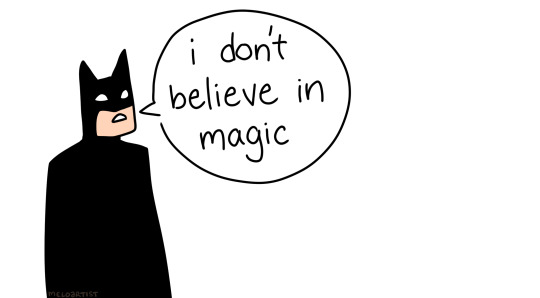
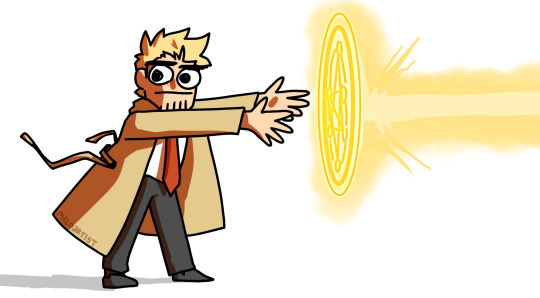
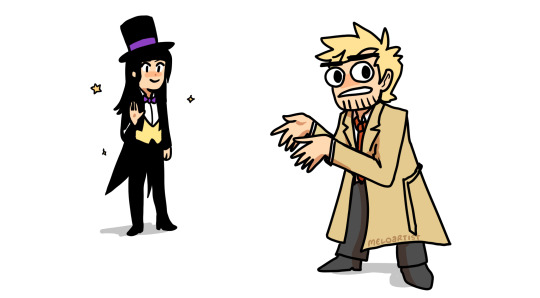
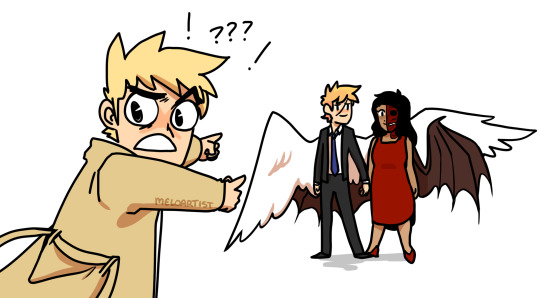
"i simply do not see it. i am looking away"
#batman#john constantine#zatanna zatara#lucifer morningstar#mazikeen#dc comics#hellblazer#if anyone is looking at this and going 'omg lucifer reference': please look at my blog please look at my blog pl#rbs > likesss!#was originally going to put the ot3 in this but i wanted a bit of a wider audience ig lmao#this was oriuginally done in ms paint and i think i put more emotion into those drawings than i have ever in my entire life before#mazikeen morningstar#mazifer#see you can make an argument that it's based to look god in the face and say you're an atheist#or that philosophically magic is just science that is beyond the scope of our knowledge#however#the way that it's always presented imo by batman...#anyway yet another 2 year old sketch i finally got around to lining#dc meme#1k
2K notes
·
View notes
Text

I LOVE THIS PANEL SO MUCH DJFHSJJS barou truly brings out the…well not the BEST in nagi necessarily but you will NEVER see that man more active than when he’s around barou
#okay imo barou actually does bring out the best in nagi but it’s by making him a little gremlin#so ig it depends on who you’re asking??#anyways i almost used this panel for my theme it’s hilarious#nagi seishiro#bllk#m’s thoughts
329 notes
·
View notes
Text
wei wuxian vs. pragmatism: what MDZS intends to say about righteousness
copy/pasting most of my rather bitchy reply into its own individual post because i think it deserves to stand on its own.
so i think we can all agree that MXTX intends for us to read MDZS and conclude that wei wuxian is ultimately a deeply heroic and righteous person. whether you as the reader agree with this assessment of wei wuxian's moral character is another question entirely, but at the very least it is fairly obvious to all of us that MXTX intends for us to read him as a good person.
so why does MXTX call wei wuxian a good person? what aspects of his character and which of his choices make him a good person? what moral framework and what definition of morality does MXTX employ in order to call wei wuxian a good person?
i posit that MXTX argues that wei wuxian is heroic precisely because he is not pragmatic - because he adheres to his moral ideals despite the consequences, and because he did not make moral sacrifices at critical junctures of his life. the first half of this post will argue that wei wuxian is not pragmatic. the second half of this post will argue that this is exactly why wei wuxian is heroic, and that the moral framework employed by MXTX is deeply idealistic instead.
so let's begin.
let's start by establishing two things.
first: what MXTX argues about morality through the narrative of MDZS and the reader's own beliefs about morality are two different things. me saying "MDZS argues that xyz is righteousness" and me saying "i think xyz is righteousness" are two different statements. the following analysis is concerned not with what i myself consider to be righteous, but rather what MXTX argues through MDZS is righteous.
second: wei wuxian is not pragmatic.
what does it mean to be pragmatic? unless we are speaking about the school of philosophy specifically (which i am not here), being pragmatic means being grounded in reality and focused on practical outcomes. it means being result-oriented and considering the consequences of your actions before you act; it means acting only after you have considered the potential consequences of all possible courses of action and have then decided which outcomes are acceptable. being pragmatic also means recognizing when achieving everything you want is impossible. and, in such situations, being pragmatic thus entails compromising to achieve a desired outcome, even if that means you don’t get everything they want. to put it in edgier terms, being pragmatic means being able to make moral sacrifices.
an idealistic person attempts the impossible. a pragmatic person recognizes when something truly is impossible.
wei wuxian is not pragmatic.
first, wei wuxian is not someone who carefully considers the consequences of his actions before he acts. in fact, he displays a startling lack of consideration for consequences. it repeatedly falls upon other characters to either try (and fail) to hold him back.
when wei wuxian punched jin zixuan for insulting first jiang yanli and then jiang cheng, did he consider that jiang fengmian and jin guangshan might then dissolve the betrothal, and that jiang yanli might have wanted to make a decision regarding that on her own? no. he just punched jin zixuan because he was mad that jin zixuan had insulted two people he loved.
when wen chao threatened mianmian, and lan wangji and jin zixuan stood up for mianmian, and then wei wuxian stood up for them by holding wen chao hostage in turn - did he consider that there might be consequences for humiliating and threatening the life of the son of a warmongering great sect leader who has already proven capable of attacking other sects? no. did he stop and think "alright, wen ruohan has already attacked the cloud recesses, which proves that he's willing to wage war against the other sects. threatening the son of a sect leader is an easy way to earn any sect leader's ire, and since i'm the first disciple of the jiang sect, this puts not just me but the entire jiang sect on wen ruohan's shitlist"? no. it would be one thing if wei wuxian weighed this possibility and then decided that rescuing an innocent girl and the people who defended her was more important was worth the risk - that would show that he considered the consequences and then made his choice. but the thought simply never entered his mind. he acted simply because he wanted to save mianmian, jin zixuan, and lan wangji from the wens; he did not think beyond that.
when wei wuxian busted the wen remnants out of the qiongqi pass labor camp, did he have a clear plan as to how he was going to weather the political fallout? did he have a plan more detailed than "live quietly in the burial mounds until everyone forgets about us"? no. when jiang cheng challenged him as to how he was going to survive the situation, he did not in fact offer anything more concrete than "we'll just wait for everyone else to forget about us." he blustered about being a once-in-a-generation genius who could accomplish the impossible, but he provided no actual plan as to how he was going to do it. this leads me to conclude that wei wuxian did not in fact have a long-term plan for handling the consequences when he went ham at the qiongqi pass camp - that, instead of weighing the consequences and then making his decision, he instead decided immediately that this was something he had to do, consequences be damned.
and then - on top of this - all of his following actions then point in the exact opposite direction of his stated plan of waiting for everyone to forget about them. because instead of doing anything to fade into the background, everything wei wuxian did instead just convinced the jianghu he was an intolerable threat.
and this was not a sustainable strategy.
one thing i really appreciate about MXTX is that she does not make the rest of the jianghu into one-dimensional villainous morons. it's quite easy for lazy writers who want a persecution plotline to have the rest of the story's society magically start hating on the protagonist for no good reason, to make every background character in the story's world a three-braincell moron. but MXTX is not that author. it speaks to MXTX's skill as an author that, from the perspective of the rest of the jianghu, fearing wei wuxian as a mortal threat was an entirely reasonable conclusion for them to come to.
first, the gentry's most recent direct interaction with wei wuxian during this time period is him threatening to kill all of them. when jin zixun doesn't give him the information he wants, wei wuxian straight up says: "if i want to kill everyone here, who can stop me? who dares stop me?" this is a threat! and - surprise - threatening to kill people naturally makes people think that you want to kill them!
next, wei wuxian refined wen ning's dead body into the first sentient fierce corpse in history, and also the strongest fierce corpse in living memory - and then took wen ning with him on night-hunts. that's where the reputation of "the yiling patriarch and his ghost general" comes from. this very naturally made the rest of society fear him even more, because now the guy who has just recently threatened to kill you has demonstrated even more of the power to easily do so! the unparalleled power to do so, which no one else possesses and it would be very hard for anyone else to counter! add in the fact that wei wuxian's activities were also attracting prospective disciples - people gathering outside the burial mounds because they wanted to learn demonic cultivation - and naturally the public is even more frightened, because now it looks like the guy who threatened to kill all of you is also gathering the political force to do so!
the public is incorrect about wei wuxian's intentions, of course. but what does wei wuxian do to correct these misconceptions? to rehabilitate his public image, because now his public image has the life of not just himself but also all the wen remnants under his protection riding on it? to prove to the public that he isn't an active threat to their lives - that he does not seek to murder them all in their beds - that it is safe for them to allow him to live, and that they can in fact survive if they don't kill him?
nothing.
it would be one thing if the story mentioned how wei wuxian tried to correct the malicious rumors about himself and failed. but that is not what happened. what happened is that wei wuxian sat on his corpse mountain and let everyone else say what they wanted to say. and when he left his corpse mountain, it was to bring his one-of-a-kind unparalleled sentient fierce corpse with him on night-hunts, which of course just fanned the flames of the rumors instead. he doesn't even tell the prospective pupils camped on his front door to fuck off - he just sneaks in through the back door.
this is not pragmatic behavior. though you can argue that wei wuxian's strategy here was to become so powerful and so scary that no one would dare try to fight him, anyone with a brain can tell you that this is not a sustainable solution in the long-term. first, if you want to use threats to keep someone from attacking you, you also need to promise stability - you need to give people the reassurance that if they don't start shit with you, then you'll leave them alone too. if you drive the "threat" factor too high, as wei wuxian did, you instead end up convincing people that if they do nothing you'll kill them anyways - that they have no choice but to kill you if they want to survive.
second, if you want to use threats to keep someone from attacking you, you also need to prepare for the inevitability that, if someone does end up getting hurt, everyone will blame you first and no one will want to hear your side of the story. after all, if someone gets hurt, then the first suspect everyone looks towards will be the guy who's been consistently saying "i'm strong enough to hurt you! i'm strong enough to hurt you! don't start shit with me because i'm strong enough to end you!" for the past few months. this is basic common sense. and yes, the society of MDZS is unfair - wei wuxian deserved a proper trial and investigation after the death of jin zixuan. but the fact that society is unfair is something a pragmatic person would have recognized and planned for.
wei wuxian did not recognize and plan for this reality. even after he accidentally kills jin zixuan, wei wuxian still insists that if only the jianghu investigates jin zixun's hundred holes curse, they'll see that wei wuxian didn't cast the hundred holes curse, they'll see that there was more scheming going on, etc etc. wen qing has to directly spell out for him that, at this point, society no longer cares about the truth of the matter. it seems that wei wuxian was actually oddly idealistic about the true nature of his society all the way until the very end.
all of this leads me to conclude that, when wei wuxian busted the wen remnants out of the qiongqi pass labor camp, he did so without considering the consequences of his actions. he assumed that he could improvise and weasel his way out of this situation, as he's always done in the past with his typical genius - only this time, he was wrong.
wei wuxian acts without considering the consequences of his actions. he does not make a decision only after carefully deliberating over all of the potential outcomes - not at all. instead, he acts in the moment - not out of any rational consideration of potential outcomes, but rather because it is simply something he must do. this by definition makes him a deeply unpragmatic person.
to put it into more familiar terms, for wei wuxian, the righteousness of an action comes not from its consequences, but are rather inherent to the action itself. even if he were doomed to fail, he could not give up on the wen remnants.
second, at critical junctures, wei wuxian is unable to make moral sacrifices. to be pragmatic is to know when you have to sacrifice: to know when, in order to achieve the most inalienable of your goals, you have to give up on some of your other goals. this is something wei wuxian is consistently unable to do.
of course, when it comes to his own wellbeing, wei wuxian is all too willing to sacrifice. he'll carve out any number of his internal organs to save those he loves. but this honestly speaks less to wei wuxian's moral framework and more to his lack of self-worth from a troubled upbringing.
because, when it comes to any moral cause, wei wuxian is entirely unable to sacrifice anything, even if being unable to sacrifice entails more negative consequences. wei wuxian could not sacrifice mianmian, jin zixuan, and lan wangji to wen chao and his goons, so he took action and took wen chao hostage himself. to sit back and do nothing as wen chao threatened the lives of those three was simply unthinkable for him - even if it meant taking a course of action that put yunmeng jiang in danger.
wei wuxian's relationship with jiang cheng deteriorated because jiang cheng did not know about the golden core transfer: because jiang cheng did not know that wei wuxian could no longer cultivate, from jiang cheng's point of view, it looked like wei wuxian was just refusing to help out and fulfill his promises for kicks. wei wuxian could have made things a lot easier for himself and also any wen remnants he chose to rescue had he simply told jiang cheng the truth - but he knew that finding out the truth of the golden core transfer would make jiang cheng miserable, and [jiang cheng's happiness] was not something he was willing to sacrifice.
wei wuxian's single most prominent moral decision is his refusal to allow the wen remnants to be sacrificed. anyone with a shred of political sense had to know that rescuing the wen remnants and then protecting them would be near impossible - that it entails making an enemy of the jin, and due to the jins' power, the entire jianghu. wei wuxian himself knew this; he is no moron. wei wuxian also had no long-term plan, no allies, and significantly less power than the rest of the world believed. yet, despite this all, he acted anyways, because he could not let the wen remnants be sacrificed.
the wen remnants wei wuxian rescued from the qiongqi pass labor camp included both regular civilians and cultivators. perhaps wei wuxian could have negotiated a proper release for the non-cultivating civilians, such as granny wen and a-yuan, had he chosen to give up on the cultivators. but - the question of whether this would have worked or not aside - this was not a sacrifice wei wuxian would be willing to make.
nor could wei wuxian sacrifice the safety of yunmeng jiang. i am firmly of the belief that, had yunmeng jiang formally stood by wei wuxian's side after wei wuxian attacked the jin-run labor camp, lanling jin would have eventually declared war on yunmeng jiang, and yunmeng jiang's would inevitably be destroyed. both wei wuxian and jiang cheng understood this as well - which is why wei wuxian told jiang cheng to let him go.
(you can argue - successfully - that wei wuxian did in fact sacrifice [his obligations to yunmeng jiang and his promise to jiang cheng] by leaving yunmeng jiang to protect the wen remnants. this is true. but i think that - from wei wuxian's point of view - this was not much of a sacrifice, because due to wei wuxian lacking a golden core, he already viewed himself as mostly useless to yunmeng jiang. so him leaving - in his view - is not really that much of a loss for yunmeng jiang.)
wei wuxian promised wen qing that he would return wen ning's consciousness to his corpse. when wei wuxian made this promise, he had no idea if he could actually pull it off or not. but then he did - and, in the process, created the most dangerous weapon the jianghu had seen in living memory. wen ning specifically, or moreso wei wuxian's inability to control him, leads to so much of wei wuxian's eventual downfall: wei wuxian loses control of wen ning and accidentally kills jin zixuan; when wen ning goes to turn himself in at jinlintai, he ends up going berserk again and killing another 10-20 jin and lan cultivators, which leads to the nightless city pledge conference. frankly, wei wuxian could have avoided a lot of trouble - or at the very least, a lot of the public's fear - had he not raised wen ning from the dead. it's not like he'd be completely defenseless without wen ning, either. but wei wuxian promised wen qing he would resurrect wen ning - and he could not sacrifice his promise to wen qing because of what wen qing had already done for him.
a pragmatic person is able to make sacrifices, including moral ones. at the very least, a pragmatic person recognizes when sacrifice is inevitable, when all paths lead to something being lost. a pragmatic person, put in the trolley problem, would recognize that there were only two options and that both options involve sacrifice: either he must kill one person, or he must allow five people to die. there is no path forwards in which all six people live.
wei wuxian is unable to make moral sacrifices. he clings on to all of these moral causes, all of these promises and obligations, and it is precisely because he attempts to hold onto all of them that he ends up losing everything. to reuse the previous example, wei wuxian in the trolley problem tried to save all six people because he could not accept any of the sacrifices made inevitable by the trolley problem.
to put this all together - wei wuxian is not a pragmatic person. he makes decisions with his gut, not his head - he does not consider the consequences of his actions before he acts. nor is wei wuxian able to make sacrifices - even necessary ones in order to avoid greater tragedies.
but. none of this means that wei wuxian is not a deeply heroic person. rather, to do what you believe to be righteous and attempt to live up to your ideals despite the consequences is exactly what MXTX lauds as moral. and to be unable to make a moral sacrifice when everyone else in your society easily does so is in fact deeply heroic.
it is precisely because wei wuxian is not pragmatic that MXTX declares him a hero.
some people, including myself, favor a moral framework that centers pragmatism and reason as virtues. to us, the ideal moral character is someone who makes decisions based on reason and not emotion, who considers the potential consequences of every course of action before making a decision, and who then, based on these inferred future consequences, uses reason to deduce which of all of the possible outcomes is the most preferable.
but this does not in fact describe wei wuxian, nor is this how wei wuxian views ethics. and to be honest, i don't think this is how MXTX views ethics either.
in all three of her stories, MXTX repeatedly comes down harder on the characters who make pragmatic decisions, the characters who are willing to sacrifice. in fact, killing sunshot soldiers while acting as wen ruohan's spy, and then killing nie mingjue's men in order to ensure a chance at killing wen ruohan and saving nie mingjue, was the pragmatic thing for meng yao to do, because that was the least bloody path forwards towards a sunshot victory over qishan wen. in fact, cutting ties with wei wuxian after he attacked the jin-run qiongqi pass labor camp was the pragmatic thing for jiang cheng to do, because it was the only path forward that did not put yunmeng jiang, his first and foremost responsibility, in the line of fire. and yet (though the situation is less clear with jin guangyao), MDZS as a narrative criticizes both jin guangyao and jiang cheng for these decisions - because, to MDZS, righteousness does not lie in pragmatism.
(this is a statement i personally disagree with. but we are here to discuss what MDZS wants to say about pragmatism and righteousness, not what i want to say about pragmatism and righteousness.)
by contrast, the one single act for which deeply controversial jiang cheng is ultimately lauded for in the narrative is also his single least pragmatic, most emotional act. the one single act of jiang cheng's that MDZS does not criticize is when, after the fall of lotus pier, jiang cheng ran out from his hiding spot to distract the wen soldiers from seeing wei wuxian. from a filial, duty-based point of view, this was a deeply stupid and unpragmatic course of action: jiang cheng's first and foremost duty, as the sole surviving jiang and new sect leader jiang, was to survive, rebuild his sect, and avenge his parents. from a consequentialist point of view, this impulsive choice is also what led to the domino-fall of tragedy that followed, since jiang cheng then got captured and had his golden core melted, which then led to everything else. yet this stupid, unpragmatic, and impulsive decision is ultimately the one act MDZS considers to be jiang cheng's single most heroic.
the key as to what MDZS considers to be heroic, what it considers to be righteous, lies in the jiang family motto: 明知不可而为之, attempt the impossible. this line, taken from the analects of confucius, can be considered to be a deeply deontological ideal. i find this twitter thread (warning to my followers: does kind of dunk on JC) to be rather helpful in elucidating this line's meaning.
to attempt the impossible, to try what shouldn't be tried. "ask yourself not whether you can do it, but whether you should...consider not the result but rather the journey - have a clear conscience regardless of outcome." in other words, what matters is less whether you succeeded or failed, or what sort of outcome your actions brought about - what matters is that you tried. what matters is that, in the face of overwhelming odds, you tried to do what you think is right. and even if you end up failing - even if everyone you sought to protect ended up dying - the fact that you tried still has moral weight.
this is why it was righteous of wei wuxian to save the wen remnants - even though the ultimate consequences of that decision were overall negative, even though everyone wei wuxian tried to protect died. in fact, if wei wuxian had died immediately - if he had been shot down by jin archers at the qiongqi pass labor camp the moment he came within their range - if he had died before any wen in the labor camp realized someone wanted to save him - he would still be a righteous person. because, for MDZS, what makes an action righteous is not its consequences. for MDZS, what makes a person righteous is not what impact their actions have on the world, but rather that they have the sort of moral character that leads them to never give up on their ideals.
wei wuxian does not consider the consequences of his actions before he acts. or, should i say - wei wuxian makes decisions despite their consequences, because despite the consequences there are simply some moral causes he simply cannot give up on. wei wuxian did not save the wen remnants because it was pragmatic to do so. it was in fact deeply unpragmatic to do so. no - wei wuxian saved the wen remnants without a concrete long-term plan, without having thought through anything beforehand, with the knowledge of how weak he was in reality - because he could not give up on the wen remnants, consequences be damned.
to have some moral causes you simply cannot give up on, no matter the consequences - to MXTX, is deeply heroic. in this sense, MXTX's moral philosophy is not pragmatic at all, because to be pragmatic is to be concerned with practical consequences. instead, both wei wuxian and MXTX herself are deeply idealistic, because what matters to them are ideals and principles that extend beyond consequence.
as the linked twitter thread notes, this is why MXTX waits until the very end of the book to reveal that wen yuan, now lan sizhui, lived. this is why wangxian only meet mianmian and her family at the end of the book. this is why all of the cumulative positive impacts of wei wuxian's resurrection - jin ling forgiving wei wuxian, jin guangyao, and wen ning, for one - are kept to the end of the story: because MDZS needs to move away from the consequentialist argument. MDZS needs to establish that wei wuxian's righteousness is separate from the impact of his actions: that wei wuxian isn't righteous merely because his actions had a positive impact for which others can thank him, but rather because the actions he undertook were inherently righteous on their own. that even if none of these positive impacts existed - if wen yuan had also died, if mianmian hadn't made it - then wei wuxian's choices would still be moral.
this is also why MDZS ultimately comes down harder on characters like jiang cheng and jin guangyao, even though a more results-oriented moral framework would instead laud such characters. both jiang cheng and jin guangyao are deeply pragmatic characters: they put concrete results before abstract moral ideals, and they're willing to compromise on their ideals in order to achieve better results. i am a JC stan and a jiggy apologist because of these exact traits. but MDZS is a narrative that criticizes such pragmatism and instead holds up wei wuxian's idealism as a moral ideal - so, in order to advance its themes, the MDZS narrative ends up criticizing both jiang cheng and jin guangyao.
ultimately, this idealism - this criticism of pragmatism - lies at the heart of MDZS's themes. wei wuxian's righteousness is directly connected to the fact that he is not pragmatic. the fact that wei wuxian makes moral decisions despite the consequences, and that he is unable to sacrifice any moral cause - is all part of what makes him at once deeply unpragmatic and deeply heroic.
---
you see, the funny thing here is that i personally disagree with this theme. as i've said before, i'm a utilitarian. to me, the morality of an action does in fact arise from its consequences; to me, someone who compromises on their ideals to achieve better results is preferable to someone who adheres to all of their ideals and then loses everything. the character i consider to have had the greatest positive impact on this story's world is jin guangyao. the character i consider to have most dutifully fulfilled his obligations is jiang cheng.
therefore, i disagree with basically everything i wrote up there about "trying": i think that if you try to do the right thing, fail epically, and in the process of your failure get a bunch of other people killed as well, the fact that you failed this badly does in fact matter quite a bit. the bulk of my more haterish posts are born from this fundamental disagreement with what MDZS posits is righteousness.
however. as a reader i must recognize that [what i consider to be moral] and [what the author of this story considers to be moral] are two different things. my own moral philosophy may be heavily results-oriented, but MXTX's is much less so. therefore, regardless of what i think of wei wuxian, i conclude that MXTX ultimately intends for us to read wei wuxian as a heroic figure for the exact reasons i gave above - and that fact must then inform every analysis of MDZS i write.
#mdzs#wei wuxian#yanyan speaks#this analysis is also focused on wwx's first life bc wwx in his second life seems to give much fewer shits about moral causes tbh#second life for wei wuxian + all the good rewards at the end is basically a victory lap lol#anyways rip jiang cheng and jin guangyao for being pragmatists in a work that celebrates idealism#get dunked on ig#anyways wwx antis will read the above and go “well isn't this just a lot of words for 'the road to hell is paved with good intentions' ”#and like. yeah. that's correct#but mxtx is placing the majority of the moral weight on those good intentions imo#to mxtx - it is better to have heroic intentions and fail epically than it is to have unheroic intentions and achieve decent results.
248 notes
·
View notes
Text
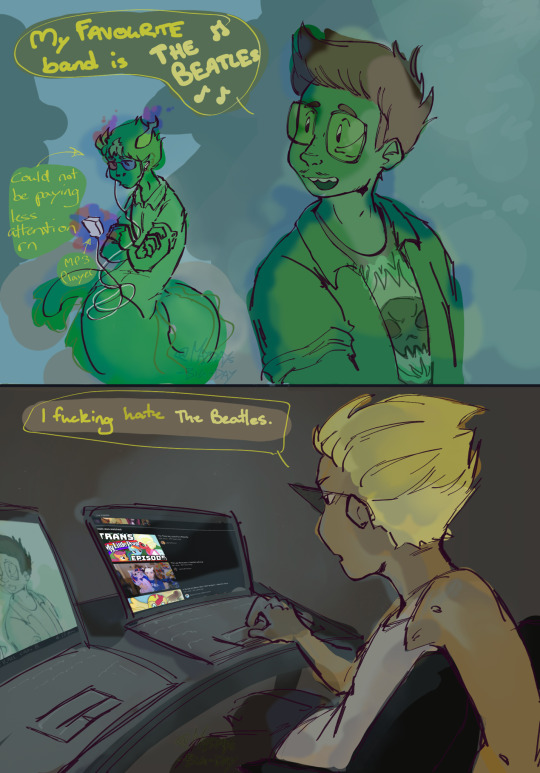
Based on:
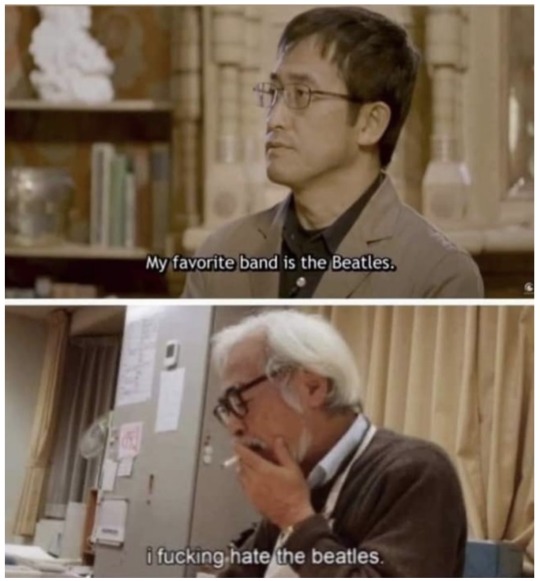
#Jake English#Erisolsprite#Dirk Strider#Dirk has trailcams he watches his friends with and passively listens to them like they’re a sitcom he’s seen before or something#weird boy behaviour fr#DirkJake#if you want it to be#Erisolsprite and Jake’s dynamic is so funny imo#I tried to base Erisolsprite’s tail and ears off an electric eel but idk if it shows#but this was becoming not fun to draw anymore so I decided to post it#Jake has a stupid lil moustache <3#idk who the two guys from the original meme are btw let me know if you know ig#Homestuck#cw cigarette#cw stalking
855 notes
·
View notes
Text
It has come to my attention that people who haven't read the comics don't realise Wallace was the one who harassed scott into being his friend. Like he saw that nerd at uni and went oh yeah that's my guy now. This bitch would not shut up and showed up at his house uninvited to hang out till scott gave in and befriended him, then they got suuuper drunk and scott let him crash at his. He comes to family dinners, is best friends with his sister, and chats to his mum.
He despises envy more than anything and is furious when she tries to mess with his life again and scott gets hurt, so he cooks him breakfast and comforts him. He coaches scott in fighting and helps with strategies so he doesn't get his ass kicked. He bullies him to leave the house because there's a heatwave and he wants to make sure he doesn't get heatstroke. Like they're close enough Wallace walks around in his underwear (though scott whines about it).
I've seen people assume Wallace supports scott out of pity but that man is a bitch and morally questionable (affectionate), I do not think he would put up with it at all if he didn't want him around, especially given he can barely afford to support them both. When they stop living together he doesn't just kick him out it's because their landlord kicks them out, he actively enchorages scott to move in with Ramona out of care for him and offers to stay with him if he needs it, though ends up signing a lease with his boyfriend (in his defence scott didn't ask for him to stay and decided to try make things work with Ramona) but still let's him stay at the new apartment with them when Ramona kicks him out.
Yeah he's mean to scott sometimes and makes fun of him/is brutally honest but he basically became part of Scott's family and part of that is calling people out when they're being a total jackass and teasing them, he's that kinda guy and scott knows that he doesn't actually hate him or something. Yeah scott will do puppy dog eyes if he wants something but wallace is frequently nice to him on his own initiative and scotts not a suck up to Wallace, he can be a bitch right back at him.
They're a really important part of each other's lives. though I can understand people not familiar with the characters who watched the show thinking Wallace doesn't care about scott being gone, literally all the characters reacted super casually. Bryan has tried to clarify his way of trying to cope is him "being a jerk"/disconnecting/acting apathetic. Also in the show o'malley basically confirms Wallace had feelings for scott and that was why he had the affair with Todd and you can quote him on that, aswell as scott admitting how they became roomates was "somewhat gay" in the comics, so there's definitely some weird more than friends emotional mess tied in there.
comic panels i reference under the cut

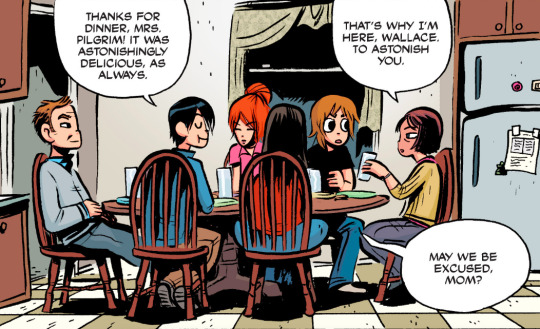

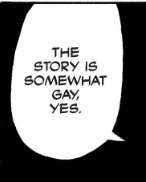
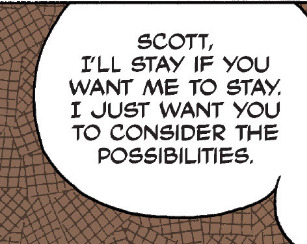
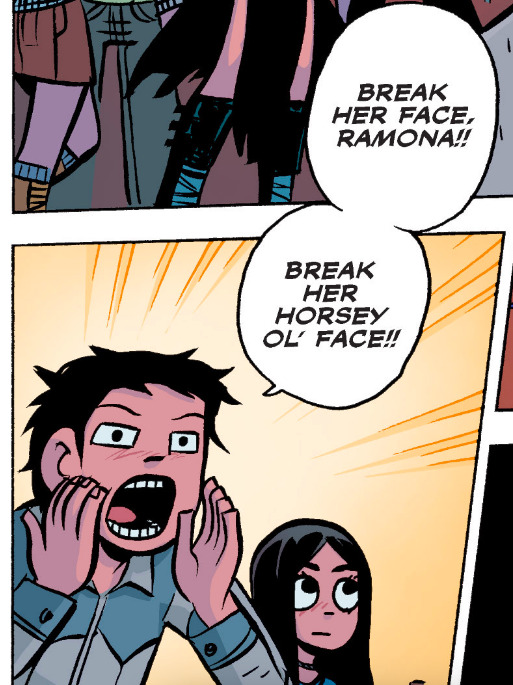







TLDR wallace lives with him because he cares about him, whether you read that as still somewhat romantic or now platonic, with either interpretations fitting better with different versions of the story
#scott pilgrim#this comic means a lot to me if you cant tell#it made me less scared of growing up reading it for the first time in middle school and countless times since#because it makes it clear that yes scott starts off as an immature selfish self centered asshole#it is made very clear and if the reader still idolises him imo it is 100% on them and a reflection of them as a person#but the comics give him the time and care to give him real character development and shows him realising all the shitty things he's done#he learns from and owns up to and faces his mistakes and in turn matures as a person#and I know mid 20's isn't old but to 13 yr old me I was supposed to have my shit together by 18 man#so seeing him be shitty and fail as an adult and still become a better person meant I wasn't doomed if I messed up#also that relationships suck sometimes and thats ok#you can fix it or move on#anyway#ig this includes scollace ?#scollace#wallace wells#hi its me
162 notes
·
View notes
Text



We are alive. And we will continue living. So long as you remain by my side.
#dead dead demon's dededededestruction#dddd#dededede#ddddedit#anime gif#anime#animeedit#animangahive#fyanimegifs#animangaladies#shoujoaiedit#allanimations#anisource#usericybtch#userinahochi#userartless#userlysandra#usersophies#userkyaa#*gifs#man this anime is insaneeeee the brutality of how it depicts humanity??#the spectrum of different reactions society has in the face of disaster#the political conflict and misinformation and the backlash in polar extremes#the war and endless violence and othering of those we deem different#but also the apathy. the fatigue. turning a blind eye to disaster. how in the midst of it all life goes on in all of its mundanity#insane how this was written in 2014 bc it feels more relevant now than ever. but humanity remains the same despite the passage of time ig#and my favorite trope of all time. dooming the world just to save one person YESSSS#also the yuri! what a pleasant surprise! and i love how queer and gnc charas just exist. no big deal#it's crazy how it's so underrated??? sure it has some uh. questionable things but i don't think they're painted in a good light at all imo#the way this show doesn't even have an edit tag LMAO i loooove giffing the most obscure niche shows of all time it's my fav hobby <33
219 notes
·
View notes
Text

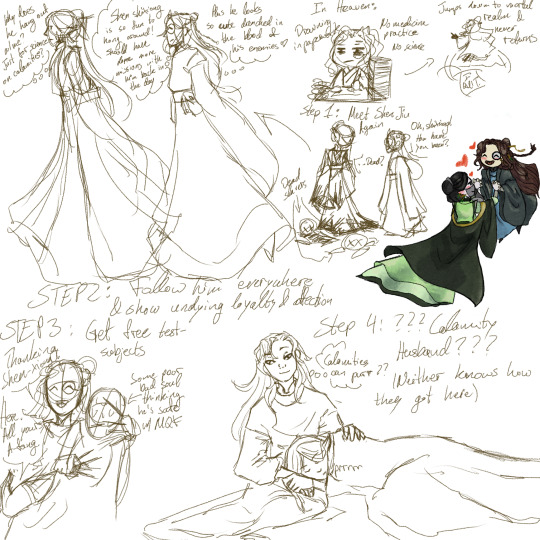
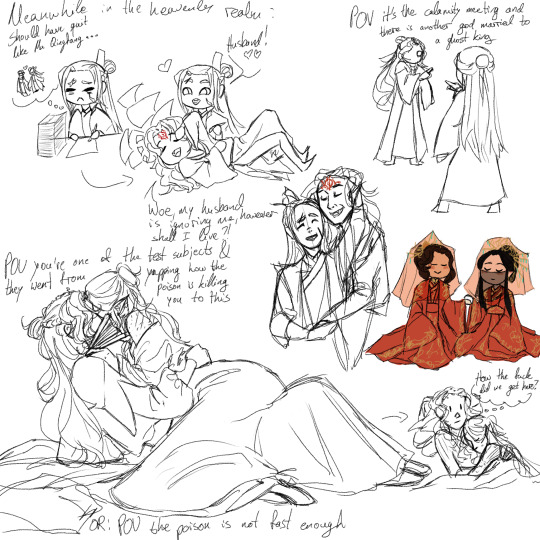
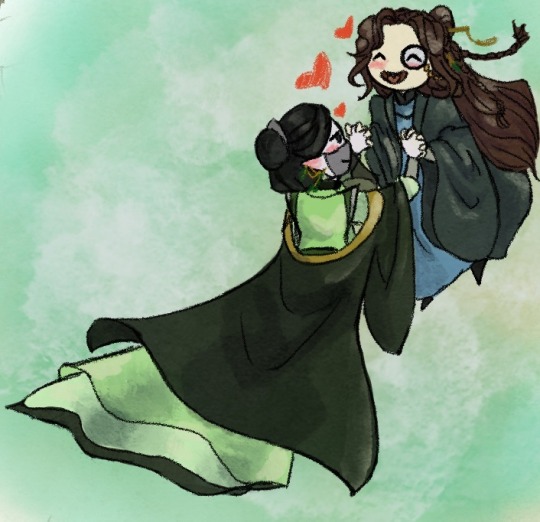
*looks at Mujiu and chuckles* I'm in danger
Calamity SJ makes a comeback this time in an AU with God!MQF!
...except Mqf quit his job because he thought heaven was too boring. Down there he meets his old Shen Shixiong! He starts following the calamity around, under the pretext of doing research on calamities! Because, why not? And SJ is tolerating his presence.
It escalates from there and by the time they're married neither knows how they got there.
Thank you to @sillyxaly who humored me with the AU and thus worked on it with me and I am so sorry for screaming about it so much with me.
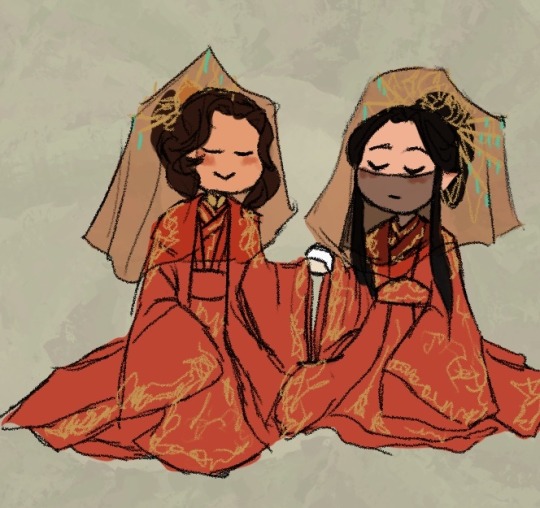
Little marriage Mujiu as extra in big <3
#svsss#shen jiu#original shen qingqiu#mu qingfang#mujiu#never thought i'd become the mujiu artist but ig i'm well on my way there might as well commit to the bit#sj rateships is the hill I'm choosing to die on damnit#i'm so sorry for all the people who have to suffer hearing me talk about this#yue qingyuan#tlj is here too but not worth tagging imo#some tianyue too <3
122 notes
·
View notes
Text
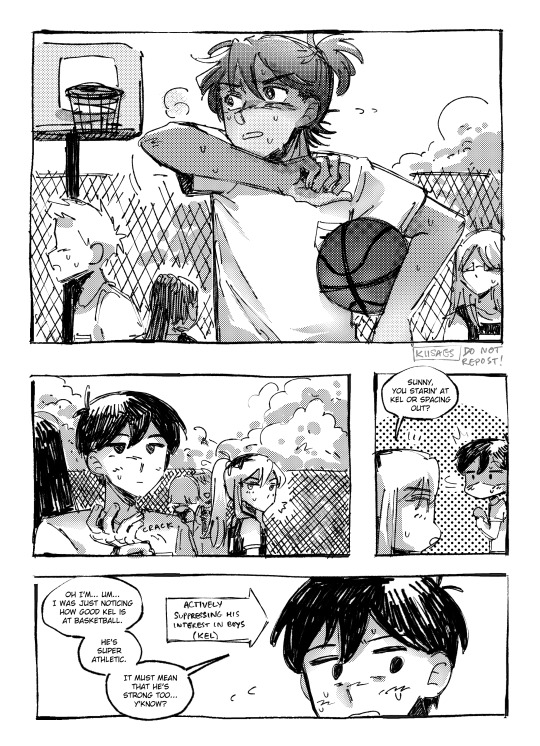
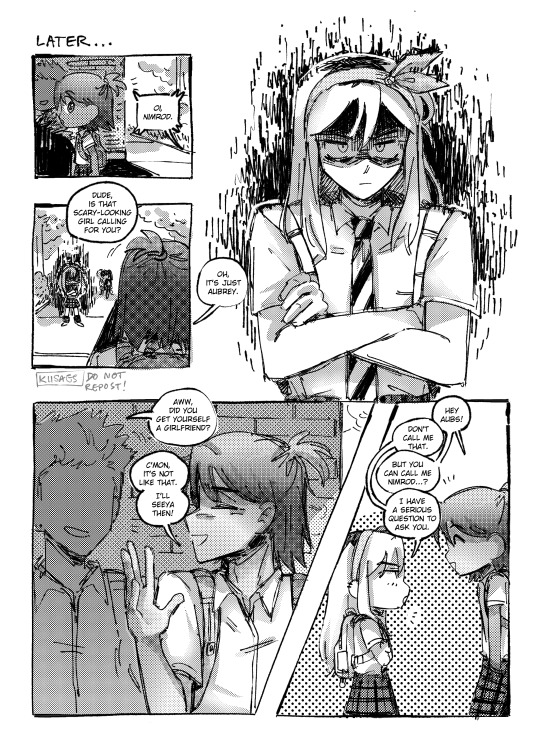
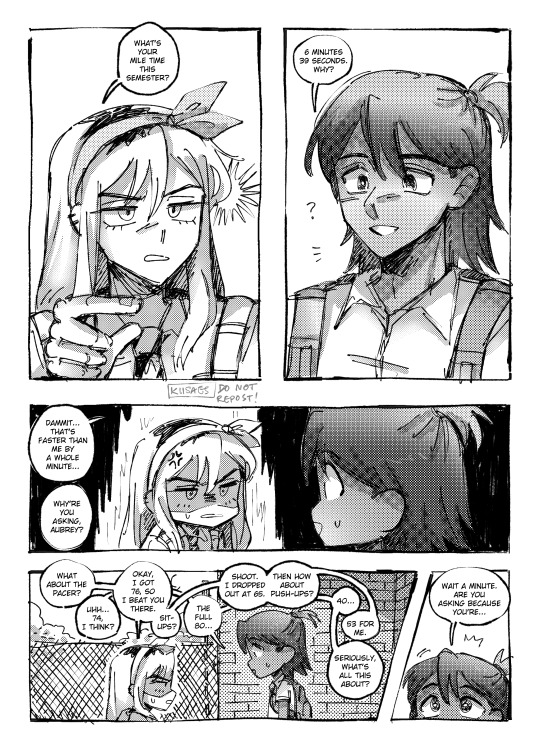
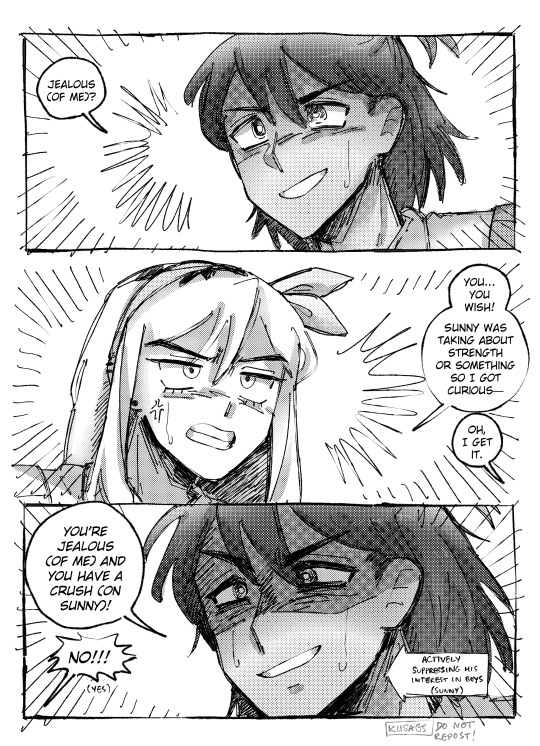
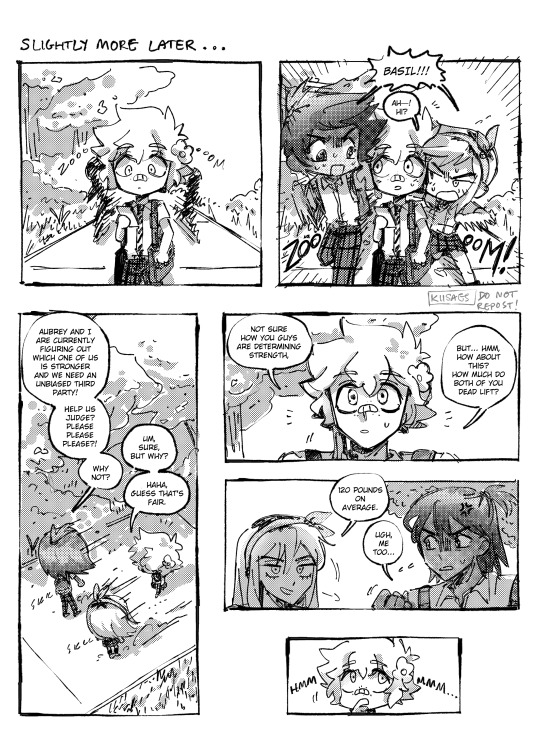
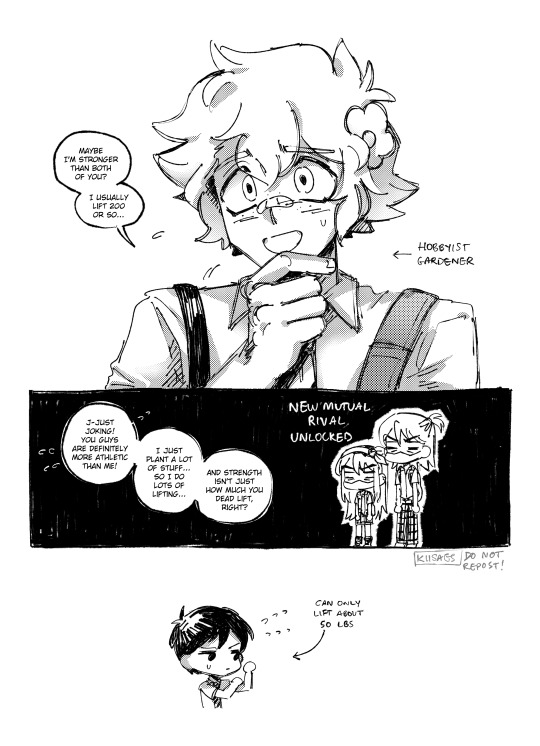
who's strongest of the faraway gang?
(catholic school au)
#or: who rightfully deserves sunny's attention?!?!?!?!?!?!#imo kel and aubrey would get irrationally obsessed with who's stronger even though it doesn't actually matter#basil is just living his life#i like drawing sunny as the unknowing shoujo protag in this au <:) idk it's just silly#omori#sunny omori#kel omori#aubrey omori#basil omori#sunburn omori#suntan omori#sunflower omori#<- (this one's more implied ig)#whatever it doesn't matter. what's important is that sunny is the center of their affections#omori au#fan art#comic#becki draws stuff n stuff
2K notes
·
View notes
Text
Man “Battle Nexus: New York” was a great episode but I do have one major gripe with it.
Like. Raph being paired up with Ghostbear? Makes sense. Works great. Works amazing, even.
Mikey being paired up with Meatsweats? Yeah that checks out!!
Donnie getting…Hypno…? I mean. I guess Donnie doesn’t like magic so it kindaaa works but Kendra would have been a much better choice to me personally. Maybe Big Mama didn’t wanna include a human or something…
And Leo getting…uh…one of the Sando Brothers???? Of all villains? Nah let’s be real, his main villain is more Big Mama herself (or Leo could be considered his own worst enemy lmao-). Hell Hypno would have probably worked better here considering their shared love for magic tricks and stuff, but Carl Sando????
#rottmnt#rise of the teenage mutant ninja turtles#battle nexus: new york#nah this will always be baffling to me#like no joke big mama really is Leo’s main villain so it makes sense that she’s not paired with him#given that she’s running this all#but giving him ONE of the Sando brothers?? not even both???#outrageous#hypno or even warren would have been better here tbh#at least there’s some basis there for both and either option would have been so fun#not that what we got WASNT fun it def was but the sando bro was the weak link because no one cares about him#and I would have killed for a Donnie Kendra forced team up 😭#Donnie also could have worked with Stockboy ig or hell even Repo tbh?#but Kendra is the much more interesting and fitting choice here for him imo#honestly though this post was made because I do NOT understand the choice of CARL SANDO#both of them together are forgettable enough#separating them gets rid of the one thing they even had#I remember watching and being like who tf is that#he’s got some funny moments but man anyone would have been better 😭#going back to Kendra and Donnie because I LOVE their dynamic#the result of their team up could have ended exactly the same as canon#only instead of Kendra not knowing chess it’s instead her and Donnie arguing about what the right move would be#and they never actually make a move because of it
390 notes
·
View notes
Text
people will really just sit around and try to win the 'think of the most depressed, traumatized, self destructive, threadbare washcloth of a man' challenge. and then decide to write a podcast about him.
#this is a callout post to#jonathan sims#arthur lester#mike walters#should i throw cecil palmer in here too#nah hes pretty stable now (imo)#i've only heard a little bit#but also#juno steel#im like two episodes into penumbra and i can already tell that boy has been through the WRINGER#jon and arthur are the most prevalent characters here but still#tma#malevolent#woe.begone#the penumbra podcast#my post#ig#theres so many tags on this post dear god im sorry
303 notes
·
View notes
Text
LMFAO the stranger things crew are so funny 😭 they’ve been filming for months with fans and paparazzi taking pics and videos, but of course right after we get pics of byler; now everyone on set wants to be proactive about leaks,, like if byler is not endgame then why are they always so afraid of us knowing anything about them 😂
#if you don’t know what i’m talking about tate brookins on ig posted he’s going on a break bc like the crew is upset about the leaks#but it seems like every time we get something about byler like for example scriptgate— the crew jumps straight into action#if mike and will don’t end up together then why act so sus around their characters relationship?? if they’re just going to stay friends like#they have been since season 1 episode 1 then why act like anything about byler is a spoiler 😭#it just proves byler is endgame even more imo lol#byler#stranger things#st5 production#st5 leaks#stranger things 5#stranger things s5#stranger things season 5
176 notes
·
View notes
Text
"I don't ship securitywaiter" I say as I continue to fall deeper and deeper down the "crackship" rabbit hole.
#ig the main reason i feel weird about it is that at the end of the day Ness is currently just a matpat-insert character#and im personally not into real person ships#tho you could argue its just his youtube persona so maybe im overthinking it idfk#the other reason is that everyone in this movie feels aroace to me (mike especially imo)#so like i cant really get myself to ship them without it feeling forced#not romantically anyway. i will gladly shoot just about any pairing with the queerplatonic ray#fnaf movie#fnaf#five nights at freddy's#mike schmidt#mike schmidt fnaf movie#ness the waiter#ness fnaf#securitywaiter#mike x ness#rambles
592 notes
·
View notes
Text

Team Gracefield!
The Promised Neverland, but make it PMD
#this just works imo.... ig both properties kind of fit into dark fantasy genres?#where half a story is about love and friendship and another half is about fighting for your life. kinda#the promised neverland#pokemon mystery dungeon#pmd#pokemon#crossover#tpn#emma#ray#norman#fanart#mmkart
139 notes
·
View notes